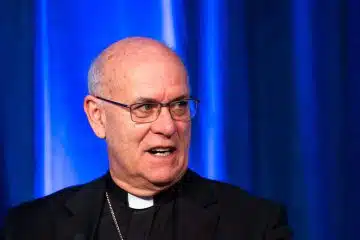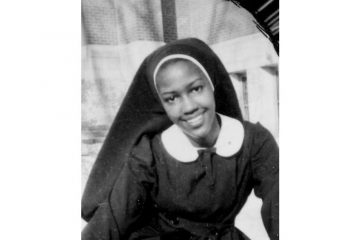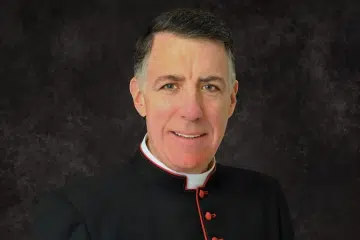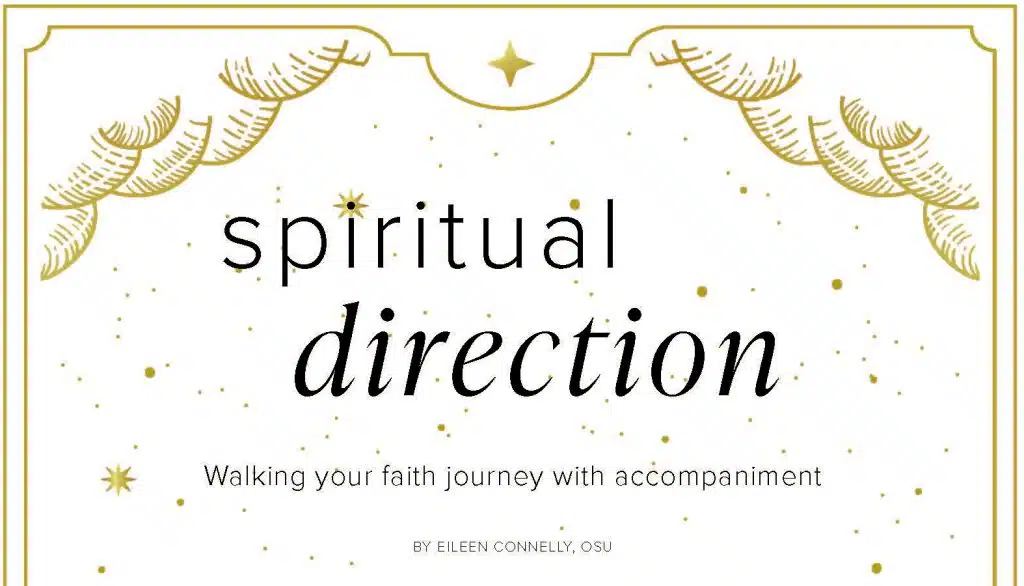Spiritual Direction
Do you desire to deepen your relationship with God and be more attentive to His presence, activity and invitation in your life? Do you feel you could benefit from walking the spiritual journey, admittedly a lonely path at times, with someone who could affirm, clarify and even challenge you along the way? Then, spiritual direction could be of assistance to you on your faith journey.
It is important to note that spiritual direction is not pastoral or psychological counseling or confession. Rather, it focuses on a person’s relationship with God, including his or her prayer life and life experiences, said Sister Donna Steffen, SC, a longtime spiritual director and retreat leader. “The term itself is almost a misnomer, because one is not actually telling another person what to do, but listening to God’s action in the moment as we are meeting. The person brings what is going on with them, what they feel is significant. The belief is that God is alive in this person, and the director’s role is to assist them in finding that inner place where God is leading them and paying attention to that.”
“It is a learning process, a journey, as people tap into their deepest life with God. It is lifegiving,” she added. “For a person who wants to grow in their relationship with God, this can be helpful.”
Spiritual directors are men and women, single, married, priests or members of religious communities, who underwent specific training to engage in this ministry. Many local spiritual directors received formal training at the Jesuit Spiritual Center in Milford, including Sister Steffen. She noted that when seeking a director, it is essential to ask candidates about their training, whether they did a practicum, where they received feedback and whether they had individual supervision.
This ministry is rooted in her own “very deep experiences of God that changed my life. I feel that God invited me into this journey,” she said. “It is so lifegiving for me to hear about people’s experiences with God, to encourage them, to support them. It feels like a gift and blessing from God that I did not create, but that God gave.”
Liz Tassone also refers to spiritual direction as a calling and gift from God, admitting she had no concept of what it was until introduced to it by a client at the radio station where she worked. “Walking with someone on their journey appealed to me,” Tassone said. “I wanted to experience that. She attended training through the Sycamore Spiritual Center in Louisville and has seen clients since 2010.
She recalls her son’s statement when she completed the program: “Now you get to tell people what to do.” “That has stayed with me, because that’s not at all what spiritual direction is about,” Tassone said. “It is about deep listening and letting that person speak from their life experience. I am just asking questions to help them go deeper and for them to know God’s presence. It is non-fixing listening. I do not think you get that [at] many places other than with a spiritual director.”
Sessions with a spiritual director create a space “where everything belongs,” Tassone said. “There is not a part of your life that does not belong. That space is held by the director in God’s love. I hope that is how I am holding the space when others are telling me their story.”
Tassone explained there are three chairs in spiritual direction: one for the director, one for the directee and a third for the Holy Spirit. “The Holy Spirit is the director, not me,” she said. “That feels so true.”
In her experience with her own spiritual director and what she has witnessed with her clients, she shared that “sometimes just speaking your truth aloud is one of the most freeing things you can do. We all need a place where we can have a compassionate listener, someone who is not judging everything you are saying. Part of the beauty of this ministry is speaking your truth in the presence of God’s love. The intent is not to fix, but to listen with compassion, and the Spirit will do what the Spirit will do. You are discerning God’s presence within your own life. It is right there.”
Dan Roche completed his training at Creighton University, and said he prefers the term spiritual companion over spiritual director, because it is a role in which one is accompanied rather than supervised. Those in this role should “practice what they preach, in a sense, practicing mindfulness and awareness,” he said. “The qualities of a good spiritual companion are their listening skills, their ability to listen at a deeper level and to really be able to hear God’s promptings from within the person and mirror back what they hear. They must have a non-anxious listening presence,
the ability to affirm the person and not engage in judgmental critiquing.”
In turn, Roche said, those seeking spiritual companionship “have to have a desire to grow and be open to God’s presence and compassion in the ways life presents itself to us, in the circumstances and the relationships that … challenge us to grow and mature. Life experience is such a profound teacher. Each of us has a unique contribution, our calling or vocation, to make in building up the reign of God, and that is affirmed in spiritual companioning.”
“I want to shout to the world that there are so many saints among us that we do not know about. There is so much good in the world,” said Tassone, reflecting on her experience as a
spiritual director. “People are not perfect, but their love is perfect. In the space of their vulnerability in their relationship with God, I hear and smile at the beauty of His creation just yearning to please and to be held and loved. The sacred space that we occupy together is also part of my journey, and I am grateful for that.”
There is no one right way to go about finding a special director, but suggestions include asking your pastor or a trusted friend for a referral, inquiring through a reputable training program and praying for God’s guidance. Most directors do ask for a stipend since it is their primary ministry, and many will offer sliding scale fees.
The Archdiocese of Cincinnati Office for Consecrated life offers valuable resources for those seeking spiritual direction. Spiritual mentoring is another option, and sometimes a preliminary step for those seeking support as they begin to develop a prayer life, the essential foundation for spiritual direction.
School of Faith offers spiritual mentoring. To learn more and sign up: [email protected].
Mary and Elizabeth is a group of spiritual directors for women. For more information, visit: https://maryandelizabeth.com/spiritual-direction-page/
Seek Direction is an online group designed to help Catholics find a spiritual director. The founders are practicing Catholics trained in Ignatian spiritual direction. Learn more at: https://seekdirection.app/#/home.














